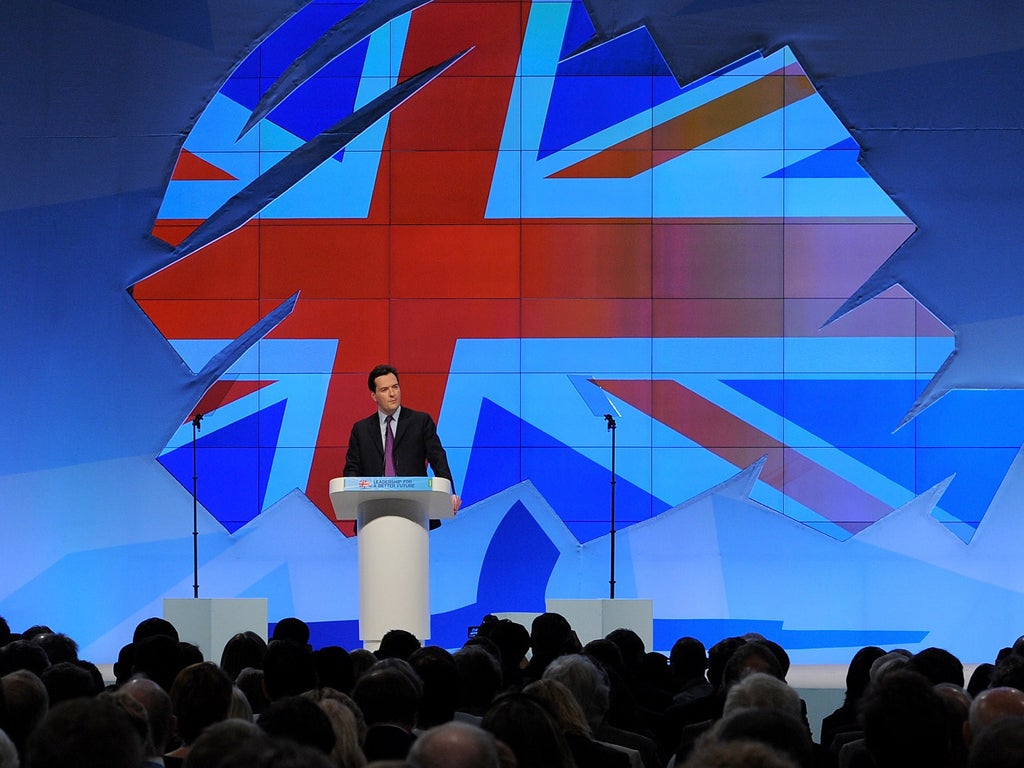George Osborne trod a fine line between self-fulfilling gloom and optimism
The Chancellor didn't have many reasons to be cheerful – but that didn't stop him looking on the bright side. Andrew Grice reports

Ministers have a real dilemma over how to respond to the dark economic clouds hanging over the Conservative Party conference.
Too much emphasis on what Winston Churchill called the "sunlit uplands" and the Tories would look dangerously out of touch with millions of families struggling with squeezed household budgets. But too much gloom and there would be a danger of turning a eurozone drama into a full-scale British crisis.
Yesterday George Osborne tried to pull off a delicate balancing act. He believes the Liberal Democrats, at their conference two weeks ago, overdosed on the gloom. So he erred on the side of cautious optimism.
"I don't want anyone to underestimate the gravity of the situation facing the world economy. But I also don't want anyone to think that the situation is hopeless, that there is nothing we can do," he said.
His message was:"Together we will ride out the storm."
The Chancellor's problem is the dire weather forecast from the rest of the world. In public, most Tory representatives at the Manchester conference put on a brave face, saying there is no alternative to the Osborne cuts plan. In private, they press ministers for a more vigorous growth policy and fear the political implications of a double-dip recession.
As one told me: "Although it would be caused by global conditions, if it happens on our watch, we will get the blame." That's politics. It happened to Gordon Brown. The high point of his premiership was the G20 London summit in 2009. He could claim to have saved the world after the financial crisis. But it didn't save his skin.
Another shadow stalks Mr Osborne: the desire to avoid a U-turn. Tory folklore includes the attempt to reflate the economy by Edward Heath, who was Prime Minister from 1970-74, to tackle soaring unemployment – and he lost the next election. In 1992, John Major and his ministers repeatedly promised that Britain would not leave the European exchange-rate mechanism and devalue the pound. It did and the Tories lost their reputation for economic competence.
Today the Chancellor's official line is that moving to a Plan B would spook the financial markets. There is another reason: it would amount to an admission that Plan A was wrong and attract the biggest U-turn headlines since last year's election, dwarfing the changes to the NHS reforms and sale of England's public forests.
Yesterday's speech was perhaps another step towards what the Liberal Democrats openly call a "Plan A plus". There will be further measures, under the banner of a "go-for-growth" strategy, in Mr Osborne's autumn statement on 29 November.
The Government recognises that it must pull every lever at its disposal. One minister described it as a "kitchen sink strategy".
Mr Osborne, like Margaret Thatcher, is not for turning. He will never call it Plan B, but he is edging towards it.
Expert advice for Osborne
David Prosser, Business Editor
Find a way to reverse the plan to cut spending on infrastructure (transport, energy and communications technology) by £12bn or 20 per cent over the next four years. Capital investment cuts are the easiest to make for Chancellors worried about politics, but also the most damaging in the longer term. Restoring that spending would provide an immediate boost to the economy - including providing vital jobs - while also ensuring Britain has the sort of basic networks and facilities without which it will be much harder to accelerate growth in the decades ahead.
Sean O'Grady, Associate Editor
George Osborne should certainly stick to his plan to reduce the deficit, even if it means it rises in the short run. Pro-growth ideas should be pursued ruthlessly, and at little or no cost to the Exchequer, such as:
1. Allowing Heathrow Airport to add more terminals, runways and flights.
2. Ending the tax relief on capital gains on principal residential homes, to divert funds into industry.
3. Remove the cap on tuition fees to secure more resources for the best universities.
Subscribe to Independent Premium to bookmark this article
Want to bookmark your favourite articles and stories to read or reference later? Start your Independent Premium subscription today.

Join our commenting forum
Join thought-provoking conversations, follow other Independent readers and see their replies